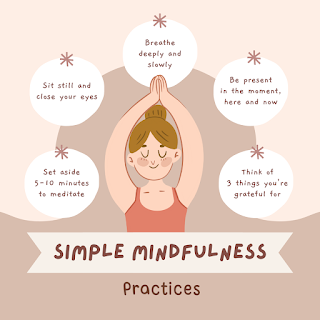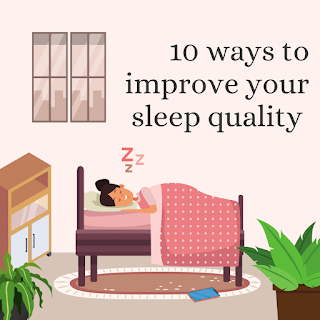Embracing self care:How to reduce stress and anxiety in our daily life.
Daily stress relief
In today's fast-paced world, it is common to experience stress and anxiety on a daily basis. Whether it's work, relationships, or personal challenges, these stressors can take a toll on our mental and physical well-being. However, it's important to prioritize self-care and find ways to reduce stress in our daily lives. By incorporating simple yet effective stress management techniques, we can create a more balanced and fulfilling lifestyle.
Reduce stress naturally
When it comes to reducing stress, there are various natural methods that can be quite helpful. Here are a few strategies you can try:
Practice mindfulness:
Take a few minutes each day to practice mindfulness meditation or deep breathing exercises. This can help relax your mind and body and bring a sense of calmness.
Engage in physical activity:
Regular exercise can be a powerful stress reliever. Whether it's going for a walk, jogging, dancing, or practicing yoga, find an activity that you enjoy and make it a part of your daily routine.
Spend time in nature:
Connecting with nature can have a soothing effect on your mind and body. Take a walk in the park, go hiking, or simply sit in your backyard and enjoy the fresh air.
Get enough sleep:
Lack of sleep can contribute to increased stress levels. Make sure you prioritize sleep and establish a bedtime routine that helps you relax and unwind.
Eat a healthy diet:
A well-balanced diet plays a crucial role in managing stress. Incorporate plenty of fruits, vegetables, whole grains, and lean proteins into your meals. Avoid excessive caffeine and sugary foods, as they can exacerbate stress and anxiety.
Coping with stress
Dealing with stress is a part of life, but it doesn't have to consume you. Here are some effective coping mechanisms that can help you manage stress:
1. Identify your stress triggers: Understanding what triggers your stress can help you develop strategies to avoid or minimize those triggers. Keep a stress journal and note down the situations, people, or activities that cause you stress.
2. Practice relaxation techniques
Engaging in relaxation techniques can help calm your mind and body. Deep breathing exercises, progressive muscle relaxation, and guided imagery are all effective techniques that can help you relax and reduce stress.
3. Seek support:
It's important to reach out to others when you're feeling overwhelmed by stress. Talk to a trusted friend, family member, or therapist who can provide a listening ear and offer support and guidance.
4. Set realistic expectations: Often, we add unnecessary stress to our lives by setting unrealistic expectations for ourselves. Learn to prioritize tasks and set achievable goals. Take breaks when needed and avoid overloading your schedule.
5. Practice self-care:
Self-care is essential for managing stress. Make time to do things you enjoy, whether it's reading a book, taking a bubble bath, or practicing a hobby. Taking care of your physical and emotional needs is crucial for your overall well-being.
Managing stress and anxiety
Stress and anxiety often go hand in hand, and managing both is important for maintaining good mental health. Here are some strategies to effectively manage stress and anxiety:
1. Prioritize self-care: As mentioned earlier, self-care is vital for managing stress and anxiety. Make it a priority to engage in activities that bring you joy and relaxation.
2. Practice time management: Effective time management can help reduce stress and anxiety. Prioritize your tasks, create a schedule, and allocate time for relaxation and self-care activities.
3. Practice positive thinking: Negative thoughts can fuel stress and anxiety. Challenge negative thinking patterns and replace them with positive and empowering thoughts. Surround yourself with positive influences and engage in activities that uplift your mood.
4. Engage in regular exercise: Physical activity not only helps reduce stress but also releases endorphins, which are natural mood lifters. Aim for at least 30 minutes of exercise most days of the week.
5. Seek professional help: If your stress and anxiety levels are significantly impacting your daily life, it may be beneficial to seek professional help. A therapist or counselor can provide you with strategies and support to effectively manage stress and anxiety.
Anxiety management techniques
1. Deep breathing exercises: Deep breathing is a simple but powerful technique that can help calm your nervous system and reduce anxiety. Take slow, deep breaths, and focus on your breath as you inhale and exhale.
2. Progressive muscle relaxation: This technique involves tensing and then relaxing each muscle group in your body. Start with your toes and work your way up to your head. This can help release tension and promote relaxation.
3. Challenge anxious thoughts: When you notice anxious thoughts, challenge their accuracy. Ask yourself if there is evidence to support these thoughts or if they are based on fear or worry. Replace negative thoughts with positive and rational ones.
4. Create a worry time: Set aside a specific time each day to worry and ruminate. During this designated time, allow yourself to fully focus on your worries. Outside of this time, redirect your thoughts and engage in activities that promote relaxation.
5. Practice self-compassion: Be kind to yourself and practice self-compassion when dealing with anxiety. Treat yourself with the same understanding and care you would offer to a loved one going through a difficult time.
Remember, embracing self-care is a journey, and it requires consistent effort and practice. Incorporate these stress and anxiety management techniques into your daily life and observe the positive impact they have on your well-being. Prioritizing self-care and taking steps to reduce stress will ultimately lead to a happier and healthier you.
















Definitely trying out these relaxation techniques.
ReplyDelete